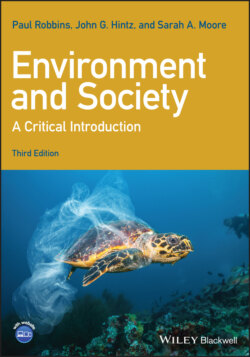Читать книгу Environment and Society - Paul Robbins - Страница 56
The Crisis of Equity: Turning Economic Injustice into Environmental Injustice?
ОглавлениеApplying the logics of the market to the environment raises basic questions about equity and rights. This is because, to the degree that the environment is “marketized,” the ability of individuals and groups to participate in environmental action and remediation, or indeed even to have access to basic environmental services (e.g. clean air or wilderness), is limited by their available capital. This holds implications for democracy. By “democratic” here, and elsewhere in this book, we refer to people’s ability within a society to have an equal voice in political decision-making and outcomes. Market environmentalism is democratic, therefore, only to the degree that the financial resources available are equally distributed throughout the population.
Nothing, of course, could be further from the truth. Turning decisions over nature into decisions within a market can be considered undemocratic because money is almost never evenly distributed within a polity. In the United States, an enormously wealthy country by global standards, the richest fifth of the population received 49% of the nation’s income in 1999, while the poorest fifth received less than 4%. In terms of overall wealth, in 1998 the top 5% of the population owned 60% of the country’s wealth. Globally, the statistics are more striking; the richest fifth of the world’s population earn 83% of all income and the richest 10% of adults control 85% of the world’s total assets. The specific concentration of wealth and income in the hands of corporate entities, rather than people, is also notable. So, too, is the unevenness over control of money and finances within households around the world, where women may be excluded from access to and control of money, even though their labor and effort provide household income. Given this reality, making politically charged environmental decisions dependent solely on economic willingness to pay may represent a profound subversion of democracy, in a world where ability to pay is so widely uneven.
As Sharon Beder has argued, moreover, the appearance of economic and scientific neutrality that market-based solutions possess may in part further disguise their fundamentally political characteristics:
The portrayal of economic instruments as neutral tools removes them from public scrutiny and gives them into the hands of economists and regulators … A market system gives power to those most able to pay. (Beder 1996, p. 61)
Market advocates respond that individuals with even paltry means exercise significant power through market actions, especially when aggregated into large bodies of consumers. So, too, they argue that most environmental values are universally desired, and “we” lack only the means to efficiently achieve these global goals. Nevertheless, it is reasonable to ask whether current fundamental inequalities in income and capital should be the ground on which to construct environmental governance. Can markets produce not only efficient but also democratic relationships between people and the environment?
Finally, many observers insist that depending on markets to solve environmental problems is a problematic place to start considering the overall, and apparently unstoppable, growth of the global capitalist economy (see Chapter 6). As global trade continues to devour, mobilize, and dump resources, objects, and fuels at an accelerating pace, it becomes difficult to imagine how such energies could ever be harnessed and simultaneously controlled. And yet the language of “markets,” “free trade,” and “ecological economics” must be admitted to be the most dominant, widespread, and uncritically accepted ways of thinking about the environment in the early twenty-first century.
